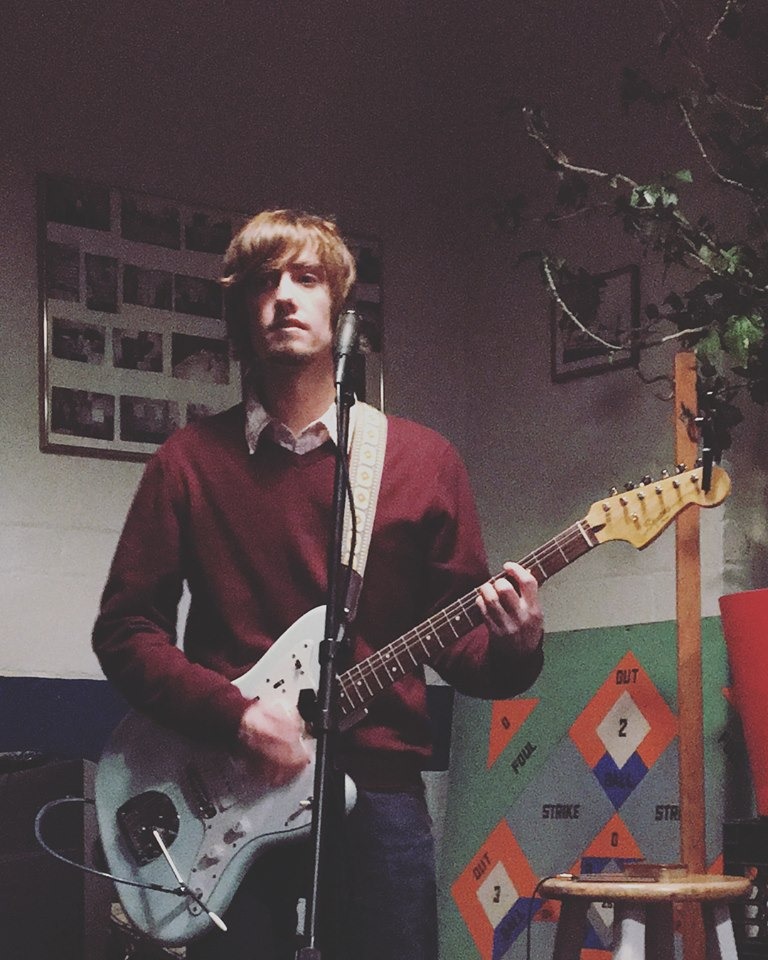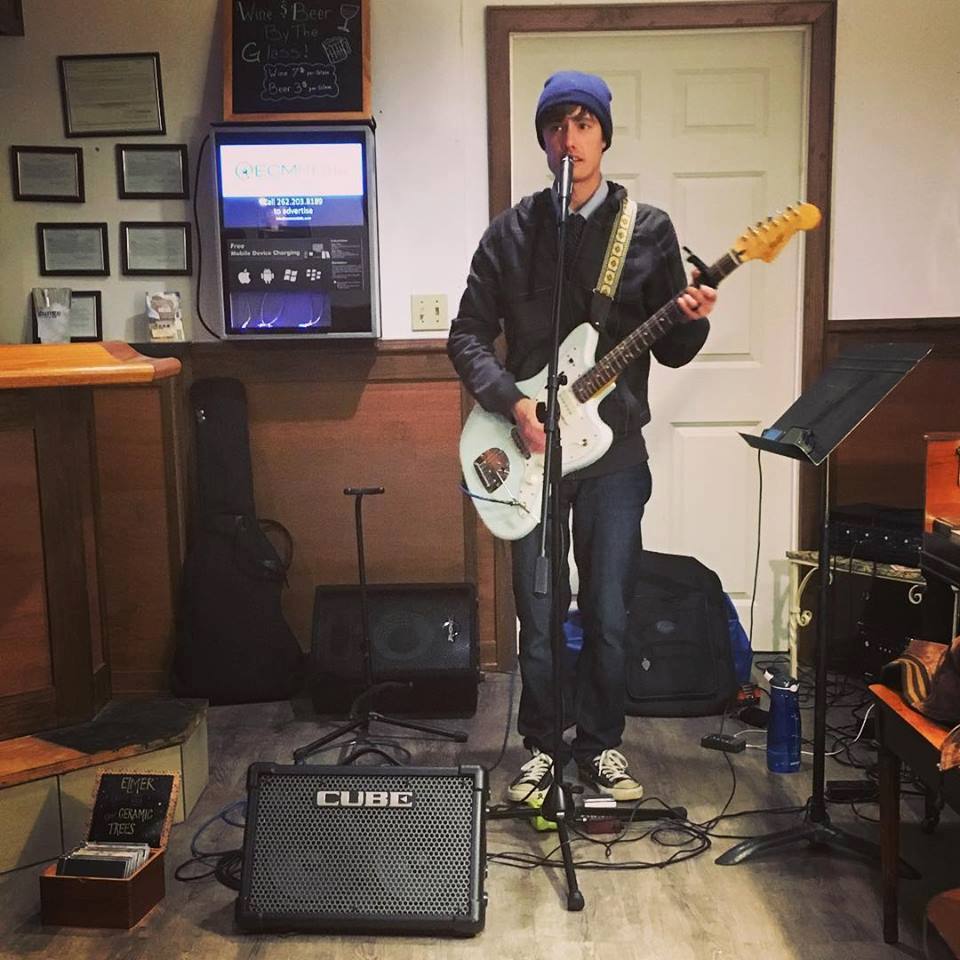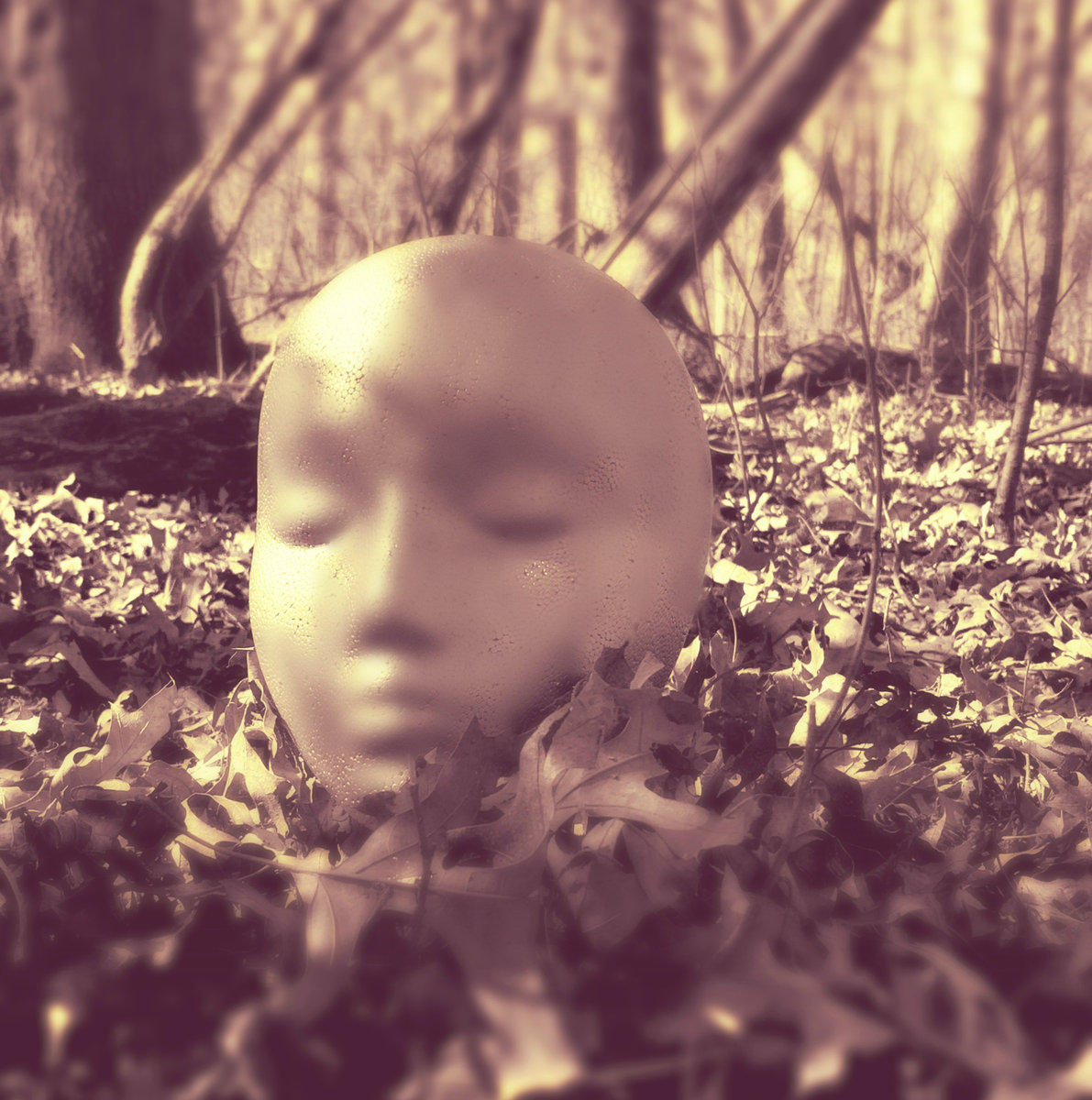| Elmer and the Ceramic Trees - i wading through the warmth of an impossible sea |
 First impressions matter when it comes to music
listening, especially to discriminating listeners. One can
often tell 10 or 20 seconds in, if he or she is listening to something
that falls in their personal wheelhouse. This kind of
reaction happened to me upon discovering Elmer and the Ceramic Trees
after one of their peer artists from the great rock town of
Janesville Wisconsin turned me on to them. The thing that
indie music often brings that you never hear in mainstream music is
this pure individuality, where the songs seem to come from a totally
original seed, they sprout up like this beautiful flower (amidst the
weeds) that you've never seen before. The effect is
particularly pointed when it comes all out of a singular person's head.
I can't tell you how many artists I've heard since I became a
curator of indie music who write the songs, sing, play all the
instruments, and produce themselves. Surely a lot, but very few of them
have the kind of vision where you feel you almost hear a direct signal
coming from their muse, whatever that happens to be.
Elmer
and the Ceramic
Trees is Robbie Haas' solo project, it's all freakin' him.
You gotta love when an artist is so free and self-contained
and has the ability to create music like this, with a full sound and
lyrics that feel like one of those spiritual roadtrip movies where the
main character goes thru all these changes up there on the screen for
all to see. Musically, the songs are melodic (which is so
important to me, anyway), and Robbie is so strong on vocals and his
music has such a deep sense of rhythm, it's really a powerful sound,
the kind of music that sounds better loud, could be played with the
Great Pyramid in the background and take over the total ambiance.
So I got a chance to ask this individualistic yet very human rock
megalith a few questions to get to know the artist a little better.
First impressions matter when it comes to music
listening, especially to discriminating listeners. One can
often tell 10 or 20 seconds in, if he or she is listening to something
that falls in their personal wheelhouse. This kind of
reaction happened to me upon discovering Elmer and the Ceramic Trees
after one of their peer artists from the great rock town of
Janesville Wisconsin turned me on to them. The thing that
indie music often brings that you never hear in mainstream music is
this pure individuality, where the songs seem to come from a totally
original seed, they sprout up like this beautiful flower (amidst the
weeds) that you've never seen before. The effect is
particularly pointed when it comes all out of a singular person's head.
I can't tell you how many artists I've heard since I became a
curator of indie music who write the songs, sing, play all the
instruments, and produce themselves. Surely a lot, but very few of them
have the kind of vision where you feel you almost hear a direct signal
coming from their muse, whatever that happens to be.
Elmer
and the Ceramic
Trees is Robbie Haas' solo project, it's all freakin' him.
You gotta love when an artist is so free and self-contained
and has the ability to create music like this, with a full sound and
lyrics that feel like one of those spiritual roadtrip movies where the
main character goes thru all these changes up there on the screen for
all to see. Musically, the songs are melodic (which is so
important to me, anyway), and Robbie is so strong on vocals and his
music has such a deep sense of rhythm, it's really a powerful sound,
the kind of music that sounds better loud, could be played with the
Great Pyramid in the background and take over the total ambiance.
So I got a chance to ask this individualistic yet very human rock
megalith a few questions to get to know the artist a little better.
(in case you want to listen while you read) ________________________________________________________________________________
Scott: ok let's start by getting this one out of the way. Your artist name. Let me take a guess. You made a ceramic tree when you were little, in vacation bible school. Then in your teen years you were a loner, staying in your room listening to records, and your only true companion was that ceramic tree? :D Is there a pic anywhere of that tree, btw?
RH: LOL! I always wish that I had some sort of great story behind my artist name, like maybe something involving an Ouija Board or something, but the sad truth is that I don't. I was just mowing the lawn one day and started mixing different names and words together, and Elmer & The Ceramic Trees is what ended up popping into my head.
Scott: I think I read somewhere that you're mainly a solo act. Did you ever attempt to have a Ceramic Forest? Do you play everything on your records and produce yourself? If so how did that come about, what was the sequence of events that got you to this point?
RH: Elmer & The Ceramic Trees has always been a solo act. I did, at one point, have hopes of turning it into a full-fledged band, although to be honest I've never made a sincere effort toward that end. I do sometimes wish I had picked an artist name that would have made it less clumbsy to explain that I am just a solo artist rather than a group. In terms of instrumentation on the albums, I perform all vocals, guitars, and bass guitars, and I use my computer to program the drums, most of the keyboards, and most of the orchestration. Some of the simpler keyboard/orchestration parts I perform myself. I also record, mix, and produce all of the music myself.
As far as how I got to this point, I guess it's been a combination of factors. I have played in bands with other musicians before, namely Pancake Riot, but I do not consider myself to be a particularly good musician, so I always feel a bit out of my element when I'm performing songs written by others. With Elmer, I feel like I generally have a pretty clear idea of what I want everything to sound like, so it's easiest for me just to play everything myself. Plus, with having a full-time job besides my music, it's nice having total control over my recording and performing schedule without having to worry about coordinating with others. On the production side of things, I do have a degree in music and recording technology so that has definitely been helpful.

Scott: I saw that you occasionally do a live show. What are your live shows like? When people go to see you do they shorten your band name and say we're going to see Elmer? :) What was your most memorable moment as far as putting your music out there?
RH: I do play live. Generally my live shows consist of me on vocals and guitar, with backing tracks providing my drums, bass, keys, and orchestration. When I first started playing live, it was something that gave me a great amount of anxiety, but it has grown into something that I love doing, and I always try to put as much energy into a performance as possible. I do get people (myself included) shortening my name to Elmer from time-to-time; another time when I wish I would have just gone with a more ambiguous name that could have worked for a solo aritst or band lol. It's hard to pick a single memorable live moment, but I was very happy with how the Isolation Masquerade release show at The Janesville Exclusive Company, a local record store, went, so I guess that I would go with that.
Scott: I know you come from Janesville Wisconsin. We have several other acts on IMP from there, (Pancake Riot and their offshoots, Aly Jayne, etc.) and you're all really good. Kind of a lively rock community for such a small town, eh? Big question: What the hell was in the water in Janesville? :)
RH: Yes! There are a lot of very talented musicians in the Janesville area. Everyone in the Janesville music community--which includes the various musicians, record and music stores, venues, and community radio--is very supportive, so that makes it easier for local artists to thrive.
Scott: In your band description, you list The Beatles and Big Star, The Cure and The Smiths, REM and The Replacements, U2 and Arcade Fire. Just wanted to tell you my first impression was more Cobainish. Are you a fan of Nirvana? Do you believe Kurt committed suicide? Also do you, like me and many of my peers, put the Beatles at the top of the ladder?
RH: I like Nirvana all right. I own both Never Mindmind and In utero, but if I am being honest, I maybe listen to each a couple times a year at most, so I would not consider them to be an influece on my music. I think a lot of the '80s alternative acts who influenced Nirvana have been influences on me as well, so I would guess that this overlap would account for any similarities. I would put The Beatles at the top of the ladder; their influence on my music is more subtle than some other artists, like Bowie or New Order, but I would definitely consider them my greatest influence. Lennon in particular.
Scott: When did you first pick up an electric guitar and do you remember the first song you wrote with it?
RH: I actually started playing bass guitar before electric guitar, and I started when I was 15. I don't remember specifically the first song I wrote with it, but everything I wrote at that stage was just a piss-poor Ramones imitation so it would have been something along those lines.
Scott: Sometimes it seems like melodic music is not going to be around much longer. Got any thoughts on that?
RH: I don't know. I guess I feel like the entire history of the music industry is just a few artists coming up with a "thing," and then that "thing" starts to make a whole lotta money, so then the various music industry gatekeepers, whether they be labels or media outlets, start pushing that "thing", and eventually the market becomes so oversaturated with other artists trying to immitate that "thing" that audiences rebel and latch onto a new "thing", and then the entire cycle just repeats itself. Melodic rock music will become fashionable with the mainstream again, it just might reincarnate into something a bit different that what's been heard before, which I think is a good thing.
Scott: I like your album title, Isolation Masquerade. Care to talk about that concept? Reminds me of a lyric from my favorite Neil Young song. "I need a crowd of people but I can't face them day to day"
RH: Thanks! The title comes from a song of the same name on the album. The primary character in that song presents a version of herself to the world that is very inauthentic. This is probably just a defense mechanism; this way if she experiences rejection, it will be less painful since it is not her real self being rejected but her inauthentic self that she wears as a mask. The flipside of this is that she cannot form any meaningful relationships because any connections that others might feel towards her are felt towards this inauthentic self, which is not really her. Most of the album deals with characters who are experiencing a deep sense of alienation or inability to deal with the lack of meaning in their lives, and they generally don't deal with these things in the best possible way, so I thought that the song title worked as an album title as well because of that.

Scott: She said, "there's no room for meaning "There's only room for truth" (from Virgo)
Are you a political person? Any thoughts on the Trump era? Is the truth more of a gray area for you now than when you were younger?
Scott: I am a political person. My politics are leftwing and socialistic, so without getting too deep into it, I really don't have anything positive to say about the Trump era.
As far as the truth becoming more of a gray area for me now than in my younger days...I guess it depends. Sometimes the truth is the truth, and just because a group of people want to push a "theory" that the Earth is flat doesn't mean that the truth of the Earth's roundness suddenly exists in some sort of gray area between two competing points of view that need to be given equal consideration. Likewise, ideologies and philosphies that seek to promote bigorty and oppression should not be given equal moral standing to those that seek to make the world a fairer and more equitable place. I do think, though, that part of the maturation process is realizing that reality is always complicated and that people and actions cannot always be divied up into clear camps of good and evil. So, in that sense--yes--I do see the truth in less black and white terms than I would have when I was younger.
Scott: And if your mind retreats
To dreams of mountain peaks
And my love won't make you swoon
Quite like the ocean view
Then I'll put California on a toothpick
And I will bring it home to you (from California on a Toothpick)
ok, are you one of these freeroving spirits who gets in his car and drives out west with a cache of drugs? (I was.) A lot of mention of the ocean in your songs coming from a guy from Wisconsin.. If so what did you think when you saw the Rocky Mountains for the first time? What were your best driving tunes for the ride?
RH: LOL! No, I'm actually not. That song was written for my wife who is from California, but moved to Wisconsin so that we could start our lives together. As far as the ocean imagery in my songs...I guess I just like the mystique of it. I have an admittedly very romantasized view of the ocean because I live nowhere near it. So, since all of my experiences with the ocean come through vacation and travel, I tend to associate it with things like freedom and relaxation...but there's always this lingering awareness that it's also this powerful force that's completely ambivalent toward your existence and that it could completely crush you if it gets in the right mood. I think that's part of why it fascinates me anyways.
Scott: ok I ask this question to all we interview on Spotlight. Have you ever had any experiences of high strangeness like UFOs or the supernatural?
RH: I don't know. I've had a few weird experiences, but I guess that I'm not really ready to attribute them to paranormal causes with any sort of certainty...
Scott: ok let's talk about your particular rock and roll dream. When you first started writing songs did it occur to you that you might be a big star someday? Did the idea of possible fame and fortune motivate your pursuit of your own music at all? Were you at all disappointed at all by how hard it is to get folks to try new music? Do you see your music as a hobby or if not, how do you think of it? Any projections of your potential destiny?
RH: I would be lying if I said that I didn't dream of stardom when I first strated writing songs, and I would be lying if I said I don't still cling to some probably unrealistic hope of being able to turn my music into a career that can pay our bills. It can be frustrating trying to reach new listeners, and there is always an underlying fear that maybe the reason it's so hard to reach people is just that I'm not that good at what I do. I don't see my music as a hobby. I guess the best way to describe how I think of it would be that I see it as a job that I greatly enjoy that doesn't really make me much money despite the hours upon hours of work that I put into it...I guess some would say that is the equivalent of a hobby, but to me it is different. I don't really have any projections of my potential destiny. I plan to keep writing, recording, and performing. I will always hope that somehow I can turn this into something more, but as long as I feel that I am continuing to improve at what I do and to connect with new listeners, I will be somewhat happy.
Elmer and the Ceramic Trees
